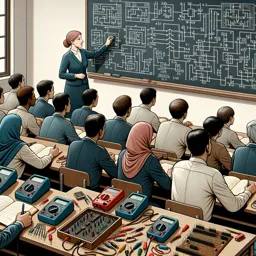Completing professional courses for electricians opens up a wide range of career opportunities. Electricians are essential in various industries, and their skills are in high demand. Here’s an overview of the potential career paths and opportunities available to those who have completed electrician training programs.
1. Residential Electrician
Residential electricians specialize in installing, maintaining, and repairing electrical systems in homes. They work on wiring, lighting, electrical panels, and other residential electrical components. This career path offers opportunities to work with homeowners, builders, and real estate developers.
2. Commercial Electrician
Commercial electricians focus on electrical systems in commercial buildings such as offices, retail stores, and restaurants. Their work includes installing and maintaining electrical systems, lighting, and power distribution. This role often involves working on larger projects and more complex systems compared to residential electricians.
3. Industrial Electrician
Industrial electricians work in manufacturing plants, factories, and other industrial settings. They are responsible for maintaining and repairing industrial machinery, electrical systems, and control systems. This career path often requires specialized knowledge of industrial equipment and safety protocols.
4. Maintenance Electrician
Maintenance electricians ensure that electrical systems in various settings are functioning correctly and efficiently. They perform routine inspections, troubleshoot issues, and make necessary repairs. Maintenance electricians can work in residential, commercial, or industrial environments, providing a stable and varied career.
5. Electrical Contractor
Electrical contractors are self-employed electricians who manage their own business. They may hire other electricians and take on various projects, including residential, commercial, and industrial work. This career path offers the potential for greater income and the flexibility of running a business.
6. Electrical Inspector
Electrical inspectors ensure that electrical installations comply with local codes and safety standards. They inspect new installations, renovations, and existing systems to ensure they are safe and up to code. This role is crucial for maintaining public safety and requires a deep understanding of electrical regulations.
7. Specialized Electrician Roles
- Automotive Electrician: Specializes in the electrical systems of vehicles, including cars, trucks, and buses.
- Marine Electrician: Works on electrical systems in boats and ships.
- Aviation Electrician: Focuses on electrical systems in aircraft.
These specialized roles require additional training and certification but offer unique career opportunities in niche markets.
8. Renewable Energy Technician
With the growing focus on sustainable energy, electricians with training in renewable energy systems are in high demand. These professionals install and maintain solar panels, wind turbines, and other renewable energy systems. This career path is ideal for those interested in green technology and sustainable practices.
9. Electrical Engineering Technician
Electrical engineering technicians assist electrical engineers in designing and developing electrical systems. They work on technical tasks such as drafting, testing, and troubleshooting electrical components and systems. This role often requires additional education and training in electrical engineering technology.
10. Education and Training Roles
Experienced electricians can transition into teaching roles, training the next generation of electricians. They can work in vocational schools, community colleges, or as independent trainers. This career path allows electricians to share their knowledge and expertise while contributing to the industry’s growth.
Conclusion
Completing professional courses for electricians provides a solid foundation for a variety of rewarding career paths. Whether working in residential, commercial, or industrial settings, electricians have numerous opportunities to apply their skills and advance their careers. Specializing in niche areas, pursuing further education, or starting a business can further enhance career prospects. The demand for skilled electricians remains high, making this a stable and promising field with diverse career opportunities.































